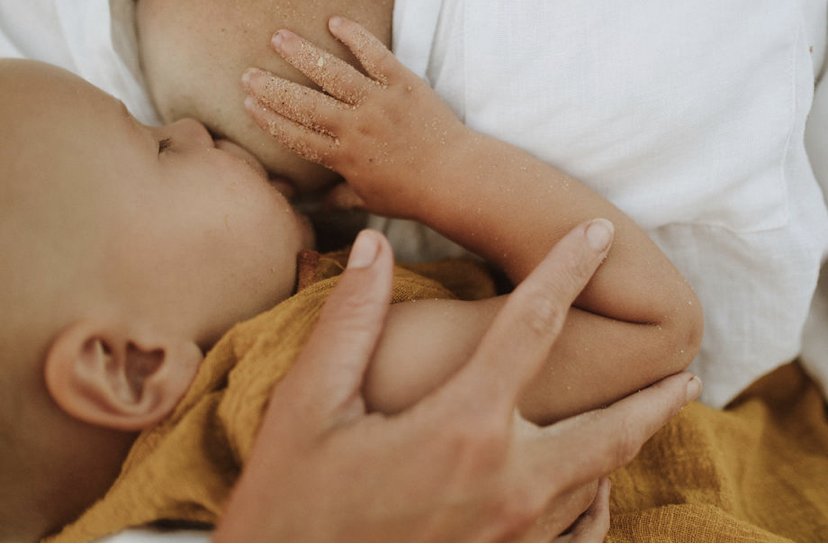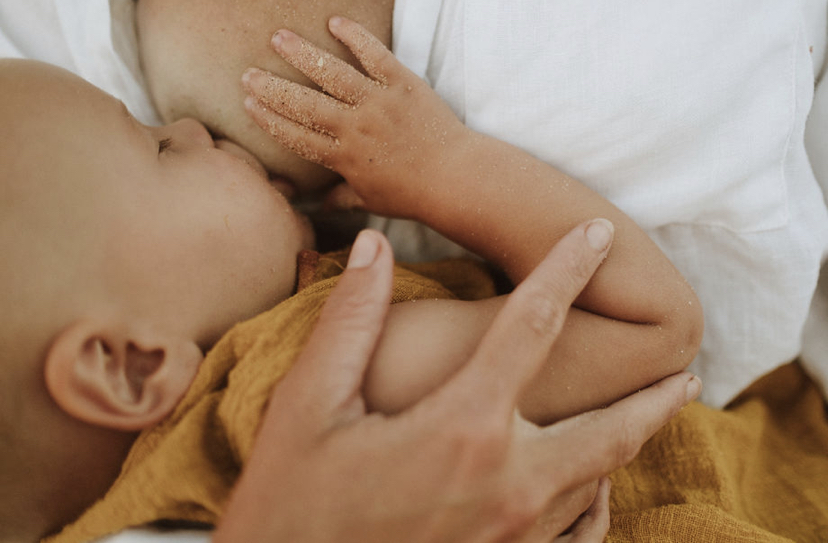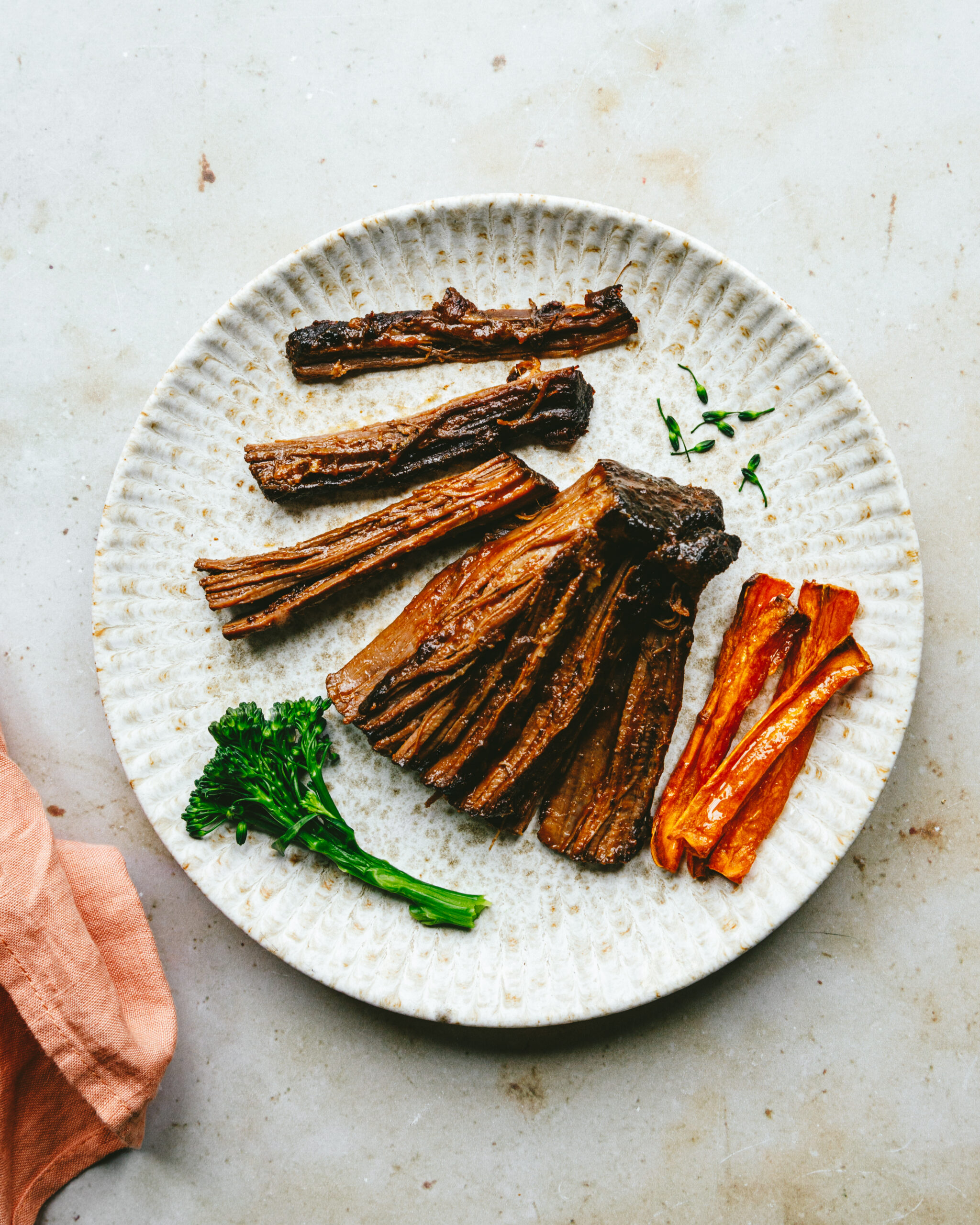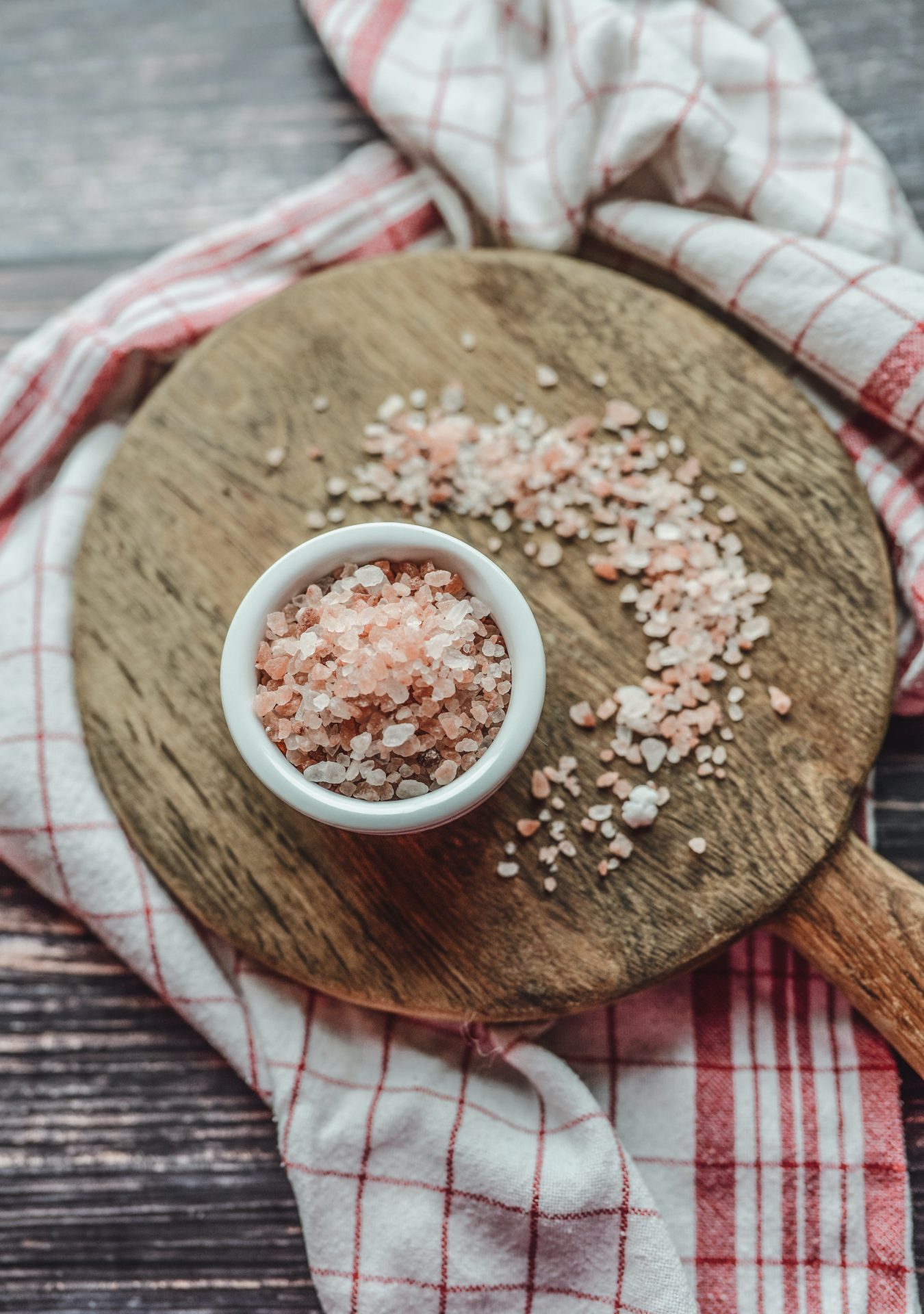Florence (1 year old) breastfeeding. Photo by Alex Warden
When to wean your babe can be a huge and emotional decision – both for you and for your little one. And while there is no black or white, right or wrong answer here, there are some guidelines we can follow to ensure that your child’s nutritional needs are being met – and that your needs are catered for too!
When is the right time?
The World Health Organisation (WHO) recommends
“that children initiate breastfeeding within the first hour of birth and be exclusively breastfed for the first 6 months of life – meaning no other foods or liquids are provided, including water.
Infants should be breastfed on demand – that is as often as the child wants, day and night. No bottles, teats or pacifiers should be used.
From the age of 6 months, children should begin eating safe and adequate complementary foods while continuing to breastfeed for up to 2 years and beyond.” (World Health Organisation, 2021)
Of course, if breastfeeding has not been possible or desirable for you and your child, then replace breastfeeds with milk feeds from formula, donor milk or expressed breast milk – again exclusively until 6 months of age, and then continued until 2 years and beyond.
It is recommended that your baby’s main source of nutrition remains as breastmilk or formula until at least 12 months of age (ABA 2022). This means that for babies under 12 months old who either self wean, or you wean from the breast (for the many valid reasons that families do), you will need to ensure that a milk substitute is included to supplement their intake of solids. This could be formula or donor breast milk (or expressed breastmilk if you have a large stash at home!) as even with the best of diets their nutritional needs may not be met. It is important to note that other milks (eg nut milk/coconut milk/soy milk/cows milk) do not meet the needs for growth and development under 12 months as their main milk feeds.
When solids are introduced the portions usually start out small (and ingestion of those portions even smaller!), and will gradually and naturally increase over time as your baby becomes more skilled at and accustomed to eating. This change will be reflected in your breast milk which will gradually decrease quite subtly over time, and your child may start to request milk feeds less.
At around 12 months of age, and when you are feeling confident in your child’s ability to eat solid food, you can start to offer a range of nutrient dense foods prior to milk feeds – so that the ingestion of solid food becomes the priority over milk. If your child is formula fed, you can gradually decrease the amount of formula and follow your baby’s cues regarding their satiety and whether they are still wanting as many or as large milk feeds – ultimately, whatever you and your baby feel comfortable with!
Replacing breastmilk/formula – is it necessary after 12 months?
Did you know that humans are the only animals that REPLACE breastmilk or formula feeds with other milk after weaning – whether this be animal or nut milk or formula? And is this really necessary?
Let’s look at the word ‘weaning’…
Weaning from the breast or formula simply means that your baby is moving away from milk feeds, and onto solid foods. Gradually their intake of milk decreases as they meet their kilojoule and nutritional needs with solid meals. So why are we then replacing the weaned milk feeds with other milk feeds?
This common practice evolved around the 1930s when the dairy and formula industries were rising and had a large say in advertising and health promotion. They projected the notion that babies NEEDED cows milk or ‘toddler formula’ after weaning for their health and nutrition. However, this is not necessarily the case. In fact, a baby that has a high amount of any replacement milk (eg cow, goat, coconut, nut milk etc) will often fill up a large portion of their daily kilojoules on that milk substitute and may in turn not eat enough nutrient dense solid food.
So what should your baby wean onto?
A well balanced, nutrient dense diet!
However, like many things relating to our health, there is no one size fits all as each child will have their own unique health requirements and will wean at different ages and stages of life for a variety of reasons! There are many important considerations when deciding to wean (although sometimes your child will decide this for you!) including how able your child is to eat and drink a variety of foods to meet their nutrient and hydration requirements, and of course how you and your bub feel emotionally about the change. As a general rule for babies over 12 months of age with no unique health requirements or need to supplement the diet, it is not necessary to offer a milk replacement for nutritional reasons. Some families or children may want to offer a replacement drink for emotional reasons or comfort, which is absolutely fine, but it is not necessary from a nutritional standpoint.
How do I comfort my baby once they’re weaned?
It can definitely be a transition for little one’s if they are used to having a milk feed for comfort – and it works so well too! But there are other ways you can comfort your child during this time including:
-
Offering more cuddles, kisses, patting and other physical touch, as well as reassuring and loving words
-
Increasing one on one time, and moments of focused play together
-
Validate their emotions and create the space for whatever they need to express
Some families still choose to offer (or some children demand!) a drink for comfort as well, which is absolutely fine. You could choose any of the following fluids – cow, goat or sheep milk, bone broth, coconut milk, nut milk or even just a drink of water or herbal tea. If you choose to offer a milk alternative to your child, such as coconut, nut and rice milk, just note that these drinks are low in protein, iron and calcium (unless fortified), so really aren’t providing any nutritional value, but can provide comfort. You also want to ensure you read the ingredients carefully as many milk alternatives have added flavours, preservatives, fillers, salt and sugars/sweeteners. Or if you feel up to it, you could make your own!
Dairy milk on the other hand (which includes cow, goat and sheep) is rich in protein, calcium and natural fats (among other nutrients). Even though these provide more nutrients, there are a few things to consider when offering it as a drink to your child.
Excessive consumption of cow’s milk is a major contributor to iron deficiency in toddlers over one year of age (Bondi and Lieuw 2009, Sandoval et al. 2002). This is due to a few reasons; cow’s milk is low in iron; children often ‘fill up’ on cows milk and therefore it may displace iron rich foods in their diet; and lastly, cow’s milk can interfere with the absorption of iron (Ziegler 2011). For this reason it is best to limit cows milk consumption to less than 500 mls in 24 hours (Domellöf 2019, Bondi and Lieuw 2009).
Lastly, there are differences in the protein found in each animal milk. Some people can tolerate the milk protein in goat milk more easily than that of cows milk, however current research does not support clear digestive benefits. The decision would depend on your child.
Daisy (3.5 years old) breastfeeding – Photo by Alex Warden
How do you know when the right time is to wean?
As mothers, we are prone to feeling guilty no matter what we do, and weaning your baby or toddler is often one of the most guilt ridden experiences there is! However ‘natural weaning’ goes both ways… yes your baby’s nutritional and emotional needs must be considered and tended to, but your needs must be honoured too. There may come a time in your breastfeeding journey where you no longer feel able to feed, may not be able to feed, may not want to feed, may need a break or rest, where your boundaries feel overwhelmed, where you feel touched out, where you have to tend to health complaints and more! And mumma, it is ok to honour this – in fact it is VITAL that you honour this. It DOES NOT make you a bad mum for putting your needs first, and while we are all for extended breastfeeding, we are also all for maternal mental health!! At the end of the day, if you go down, the whole ship goes down with you.
Weaning can bring up deep emotions for you and your child, no matter the age. These emotions are normal, and the best thing you can do is help them feel safe, loved and heard during this time of transition. Aim to provide your child with lots of physical touch – this will meet your needs as well as your baby’s. Hold them close and smother them with kisses – spend time together and establish a connection and rhythm in other ways to fill your cups outside of breastfeeding.
Nutritionally supporting yourself during weaning
We’ve discussed nutritionally supporting your baby through weaning, but what about you?
Did you know that when weaning (especially suddenly) you can experience feelings likened to the ‘3 day baby blues’ or PMS symptoms. Not only can this be a time that is stressful, emotional and guilt ridden, but you will also be diminishing that extra production of the magical hormone oxytocin which is released while breastfeeding (this hormone promotes happiness, deep relaxation and good feelings/love).
Symptoms of weaning can include mood swings, lack of motivation, skin breakouts, irritability, weepiness and anxiety. Not to mention the return of your menstrual cycle if it hasn’t returned already. So, how can we minimise these effects?
1. Reduce the consumption of sugar and caffeine as they can disrupt this delicate hormonal system and contribute to feelings of anxiety and irritability.
2. Aim to keep your blood sugar levels stable – balance your meals and snacks with protein, natural fats and fibre. This will slow down the digestion of carbohydrates and prevent large fluctuations in blood sugars.
3. Try some maca – this Peruvian root has a long traditional history of use as an adaptogen – meaning that it helps to support the body’s ability to deal with stress, as well as being traditionally used to aid hormonal balance, support energy and it has a beautiful nutty caramel flavour making it great to include in smoothies or other dishes. This recipe is an excerpt from Milk to Meals… a beautiful hormone balancing smoothie!
It includes maca as well as a balance of healthy fats and protein to keep your blood sugars stable:
Ingredients:
1 frozen banana
300 ml coconut milk
1 – 2 tsp maca
1 tbsp nut butter (delicious with macadamia or almond)
1 tsp MCT oil
5 ice cubes
1 tsp cinnamon
1 date (optional sweetness)
Optional: 1 serve vanilla protein powder (I use this)
Method:
Blend all together and enjoy!
Will (16 months old) breastfeeding. Photo by Kobe Jade Photography
What if you don’t want to wean? Even though you can wean at 12 months- should you?
If your baby is still happily breast or formula feeding after 12 months and you are also happy, then continue this!
Remember, the World Health Organisation recommends breastfeeding until at least 2 years of age. This is because no matter the age, breastfeeding is ALWAYS beneficial. Not only is breastmilk an extremely nutrient dense food – high in omega-3 fats like DHA and EPA, vitamin A, vitamin B12, folate, calcium, protein and carbohydrates – it is also ALIVE! This means the nutritional and immunological components of breast milk change every day according to the specific needs of your child! Breast milk is full of beneficial microbes and prebiotics (much like a personalised fermented food!) to keep your child’s digestive system functioning optimally. And did you know if your child is sick your breast milk will provide the antibodies needed to help fight that illness?! AND breastfed children appear to have less incidence of illness due to these amazing immunological components of breastmilk.
This post isn’t intended to put blame or guilt on anyone who chooses to wean prior to 2 years – as discussed, there are so many reasons why you may choose to do this, need to do this, or why your child may do this for you. Our aim is to empower those who choose to continue feeding, and to provide information to those at all stages of their weaning journey. According to the ABA only 21% of Australian women are still breastfeeding after 12 months (ABA 2022), so obviously more education and information is necessary to normalise and support this very natural process ❤️
REFERENCES
World Health Organisation (2021), Infant and young child feeding, https://www.who.int/news-room/fact-sheets/detail/infant-and-young-child-feeding (accessed 24.11.22)
Australian Breastfeeding Association (2022), Solids – getting prepared https://www.breastfeeding.asn.au/resources/solids-getting-prepared (accessed 11.11.22)
Australian Breastfeeding Association (2022), Wondering how long to keep breastfeeding? https://www.breastfeeding.asn.au/resources/wondering-how-long-breastfeed (accessed 11.11.22)
National Health and Medical Research Council (NHMRC). (2012). Infant feeding guidelines: Information for health workers. Australian Government Department of Health and Ageing, https://www.nhmrc.gov.au/about-us/publications/infant-feeding-guidelines-information-health-workers (accessed 11.11.22)
Bondi S and Liew K. Excessive Cow’s Milk Consumption and Iron Deficiency in Toddlers. ICAN: Infant, Child & Adolescent Nutrition. 2009; 1: 133-139.
Sandoval C, Berger E, Ozkaynak MF, Tugal O, Jayabose S. Severe iron deficiency anemia in 42 pediatric patients. Pediatr Hematol Oncol. 2002;19:157-161.
Ekhard E Ziegler, Consumption of cow’s milk as a cause of iron deficiency in infants and toddlers, Nutrition Reviews, Volume 69, Issue suppl_1, November 2011, Pages S37–S42, https://doi.org/10.1111/j.1753-4887.2011.00431.x
Domellöf, M., Braegger, C., Campoy, C., Colomb, V., Decsi, T., Fewtrell, M., Hojsak, I., Mihatsch, W., Molgaard, C., Shamir, R., Turck, D., & van Goudoever, J. (2014). Iron Requirements of Infants and Toddlers. Journal of Pediatric Gastroenterology & Nutrition, 58(1), 119–129. https://doi.org/10.1097/mpg.0000000000000206
WRITTEN BY:
Luka McCabe (RN/RM/Nutrition Consultant)
Kate Holm (Naturopath & Nutritionist)
REVIEWED BY:
Renee Jennings (Dietitian and Nutritionist, APD)







Latest research shows only 15 % babies being exclusively breastfed to 5 months – definitely needs to be more education in the prenatal period and support postnatal to improve these numbers!
https://www1.health.gov.au/internet/main/publishing.nsf/Content/health-pubhlth-strateg-brfeed-index.htm
Thank you so much for this. It’s exactly what I needed right now being at 13 months breast feeding and wondering where to from now. You are just the best I don’t know what I would do with out your knowledge and advice
Thank you so much, this is very helpful.
I am trying to build up a supply for my freezer, before I go back to work and have been pumping atvthe end of a feed. I am only getting 20mls at this stage (baby 8 months old). If I pump after feeding, will this overstimulate the breast too much? 🙂
Such a great post, thanks Luka! I expected my breastfeeding journey to go on for longer, but at almost 9 months I’m a bit over it! So nice to be able to acknowledge that and know that it’s ok for my needs to matter as well as my baby’s! X
Thanks! I have been looking for this info for a long time. You haven’t mentioned oat milk? This has been an alternative for us as my son couldn’t have dairy or any formula available.